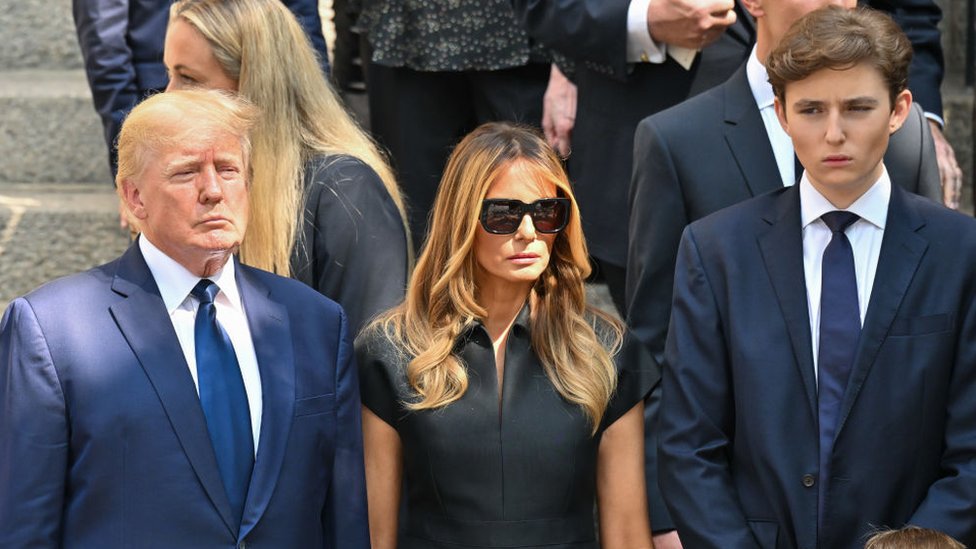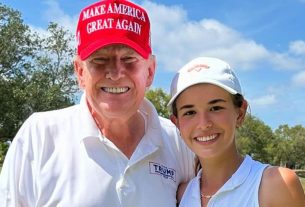Former First Lady Melania Trump has issued a direct response through her spokesperson addressing false online claims about her son, Barron Trump, and his college application status. The clarification comes after days of speculation linking Barron to the political tensions between former President Donald Trump and Harvard University.
The rumors, which originated on social media platforms and gained traction across various forums, suggested that Barron Trump had applied to and was rejected by Harvard. These claims were quickly dismissed by Melania Trump’s office as entirely unfounded.
Source: Palm Beach Post
Melania Trump’s Official Statement
In a statement released to media outlets, Melania Trump’s spokesperson Nicholas Clemens made it clear that the online rumors had “no basis in fact.” He stated unequivocally that Barron Trump did not apply to Harvard, nor did anyone else apply on his behalf.
This response follows heightened public curiosity after Donald Trump made a series of comments on Truth Social targeting Ivy League institutions, particularly Harvard University. Critics and commentators speculated whether those remarks were personally motivated. However, no official information supports such theories, and the Trump family has not made any additional statements linking the college choices of Barron to the broader political discourse.
Source: Palm Beach Post – May 2025
Barron Trump’s College Decision Confirmed
In a 2024 interview with the Daily Mail, Donald Trump confirmed that Barron Trump had been accepted into several colleges and ultimately chose to attend the Stern School of Business at New York University (NYU). Trump noted that Barron appreciated the school’s focus on finance and entrepreneurship and preferred its location and academic environment.
There has been no verified report indicating that Barron applied to Harvard, Columbia, or any other Ivy League school, despite continued speculation online. NYU’s Stern School of Business is recognized globally for its rigorous academic standards and programs in business, economics, and leadership.
Sources:
– Daily Mail Interview, 2024
– NYU Stern School of Business
Donald Trump’s Public Comments on Harvard
Former President Donald Trump has recently been vocal in criticizing Harvard University. On Truth Social, he suggested reevaluating federal funding to the institution, citing ideological disagreements and allegations of antisemitism in academic settings—issues that have been covered extensively in political reporting since early 2024.
Trump proposed redirecting federal funds from Ivy League universities to trade schools and community colleges. These comments sparked widespread public discourse and renewed scrutiny of elite educational institutions and their role in American society. However, there is no evidence linking these political statements to any personal grievance involving Barron Trump’s college admission process.
Source: Truth Social Posts – Public Archives, May 2025
– Reuters: Trump Criticizes Elite Universities
The Role of Social Media and Political Narratives
Following Trump’s remarks, various posts on X (formerly Twitter) and online forums began suggesting that the criticism stemmed from personal frustration over Barron’s alleged college rejection. One of the most circulated messages referenced a 2024 post by Senator Sheldon Whitehouse, who questioned the Trump administration’s relationship with elite institutions. However, the senator did not provide any specific claims regarding Barron Trump.
Online speculation has continued despite the lack of verifiable evidence. Experts in digital media ethics have cautioned against drawing conclusions based on unsubstantiated social media posts. Public figures, particularly children of politicians, are often subjected to baseless narratives that can cause reputational harm and spread misinformation.
Sources:
– X (formerly Twitter) – Sheldon Whitehouse Post Archive
– Center for Digital Ethics & Policy
Respecting the Privacy of Public Figures’ Children
Numerous advocacy groups, including the National Association for Media Literacy Education (NAMLE) and Common Sense Media, have emphasized the importance of protecting the privacy of public figures’ children. In the case of Barron Trump, who turned 18 earlier this year, the public has shown significant interest in his educational journey. Still, experts recommend caution in how such topics are covered in the media.
Melania Trump’s statement reflects that concern, drawing a clear line between political commentary and the private lives of children. Her office has urged news organizations and social media users to avoid spreading misinformation that could affect the well-being or reputation of individuals not actively engaged in public political roles.
Sources:
– NAMLE – Media Ethics on Minors
– Common Sense Media – Guidelines on Public Figures’ Children
A Broader Look at Higher Education and Political Debate
The former president’s remarks also occur in a broader national conversation about the value and accessibility of higher education. Discussions around student loan reform, diversity in admissions, and political bias on college campuses have intensified in the last two years, involving voices from across the political spectrum.
While Donald Trump has consistently questioned elite institutions’ influence, there is no official policy linking these views to any family-related matter. The administration under President Joe Biden has also proposed changes to educational funding, reflecting a shared bipartisan interest in reforming higher education to be more inclusive and effective.
Sources:
– Department of Education
– Brookings Institution – Higher Education Policy
Conclusion: Verified Statements vs. Speculation
The rumor suggesting that Barron Trump was rejected by Harvard has been officially denied by Melania Trump’s spokesperson, who labeled the claim as entirely false. Public confirmation of Barron’s acceptance into NYU’s Stern School of Business was previously given by Donald Trump in an interview, aligning with the only verifiable reports available to date.
Amid ongoing political commentary, it’s critical to distinguish between substantiated facts and viral speculation. Media consumers and publishers are encouraged to rely on primary sources and credible journalism when engaging with sensitive personal matters involving public figures and their families.








